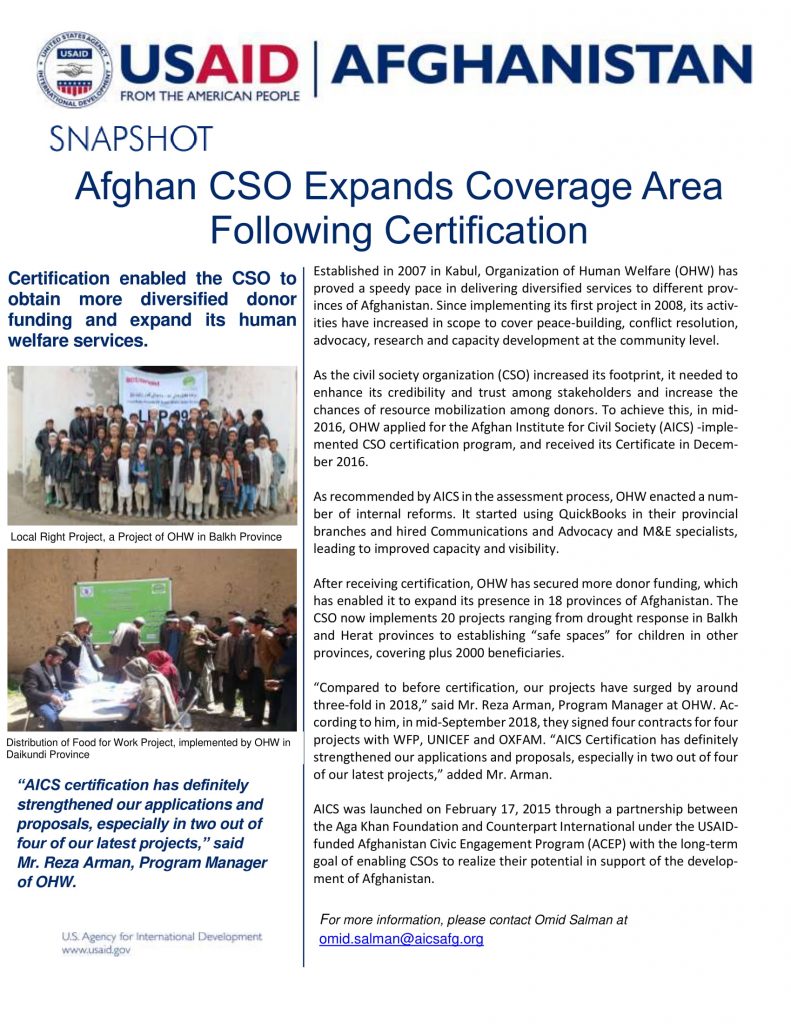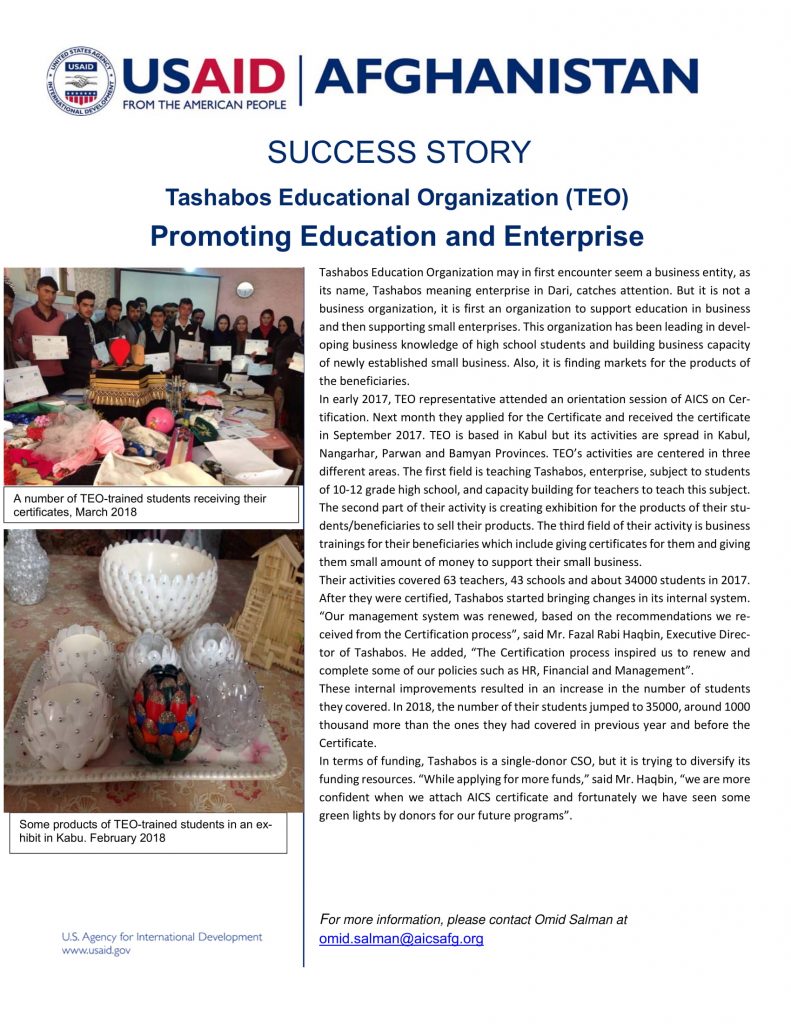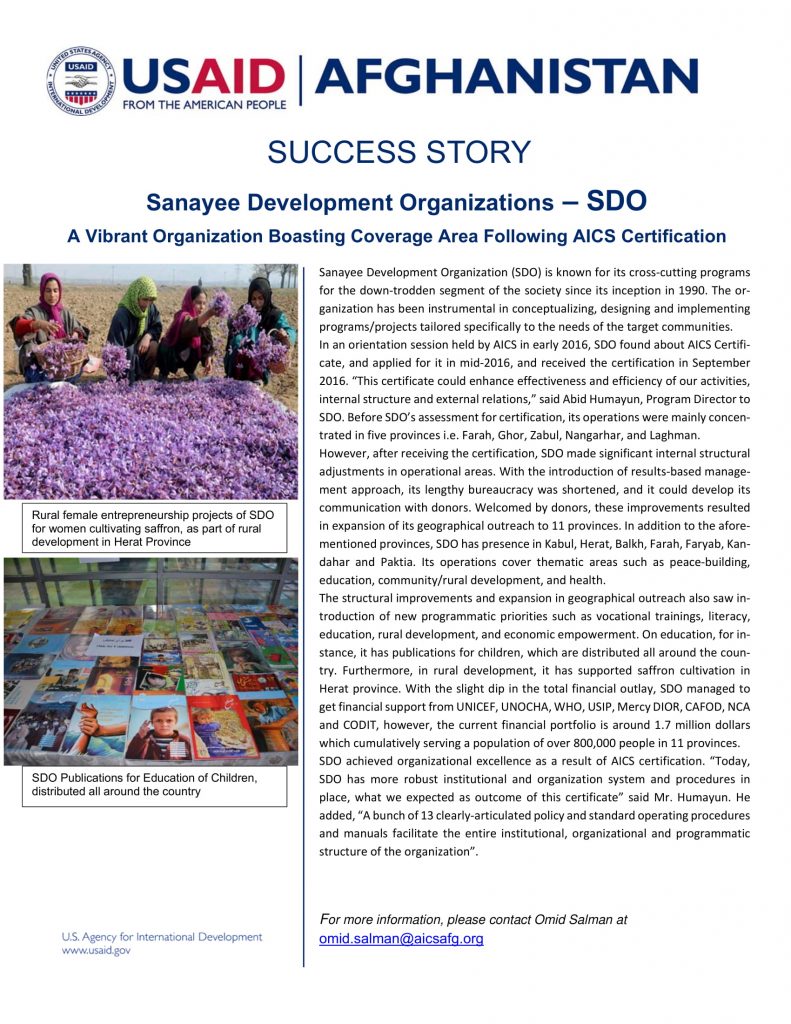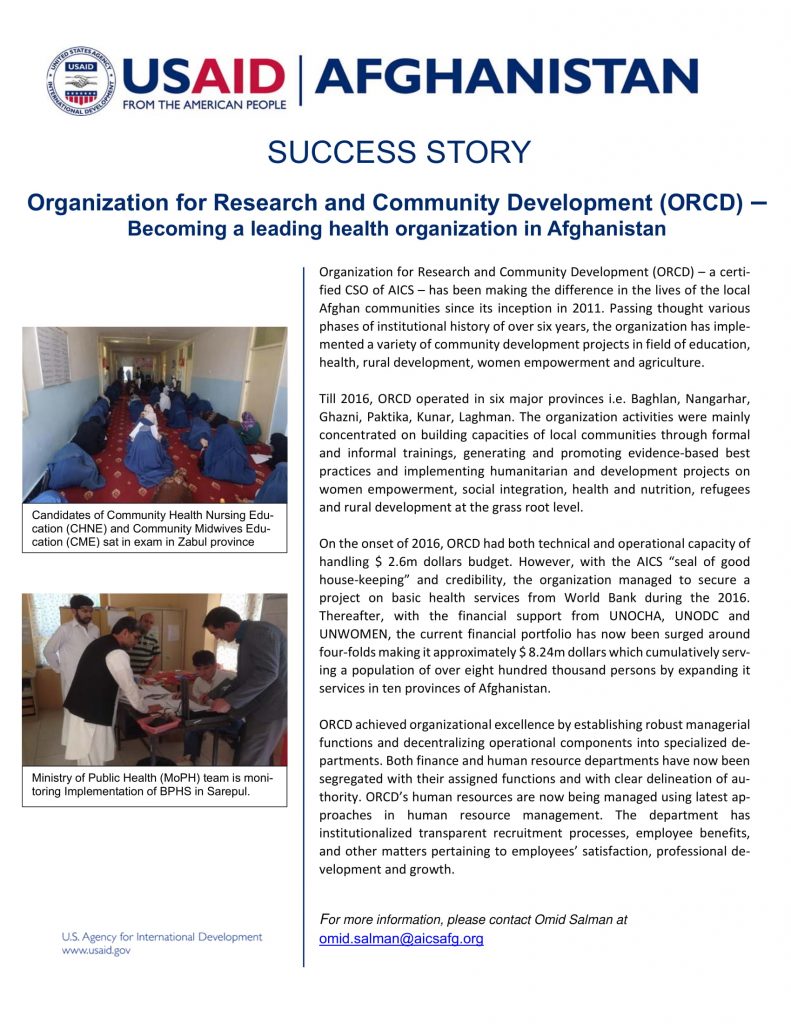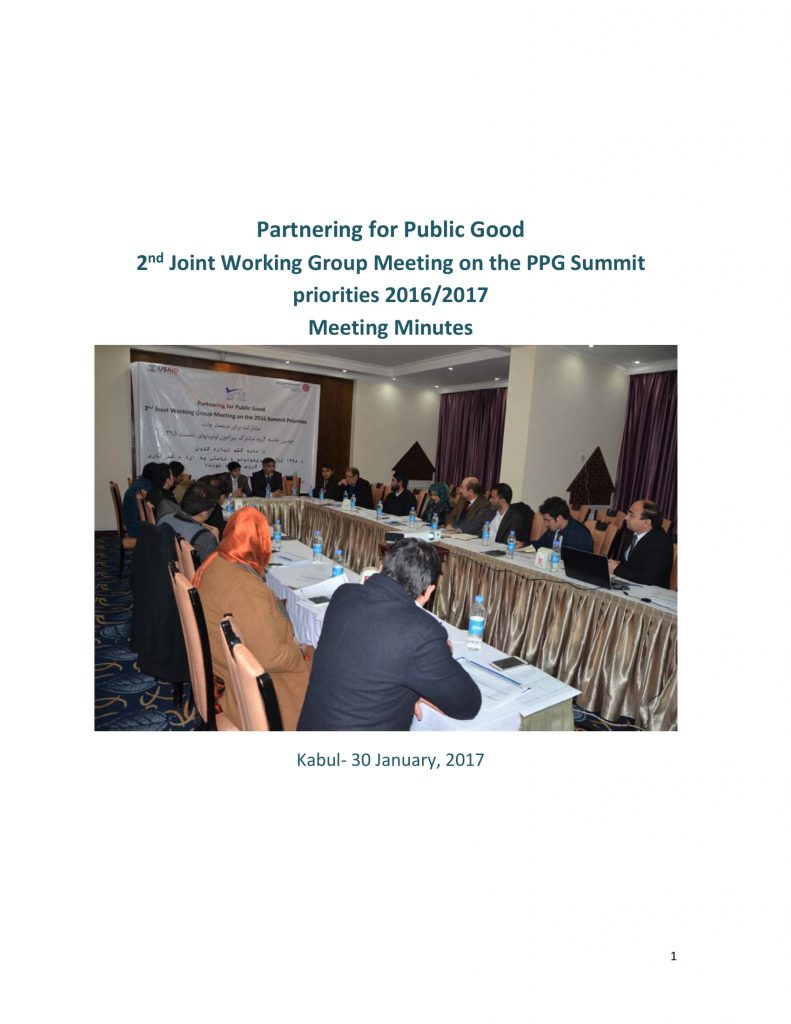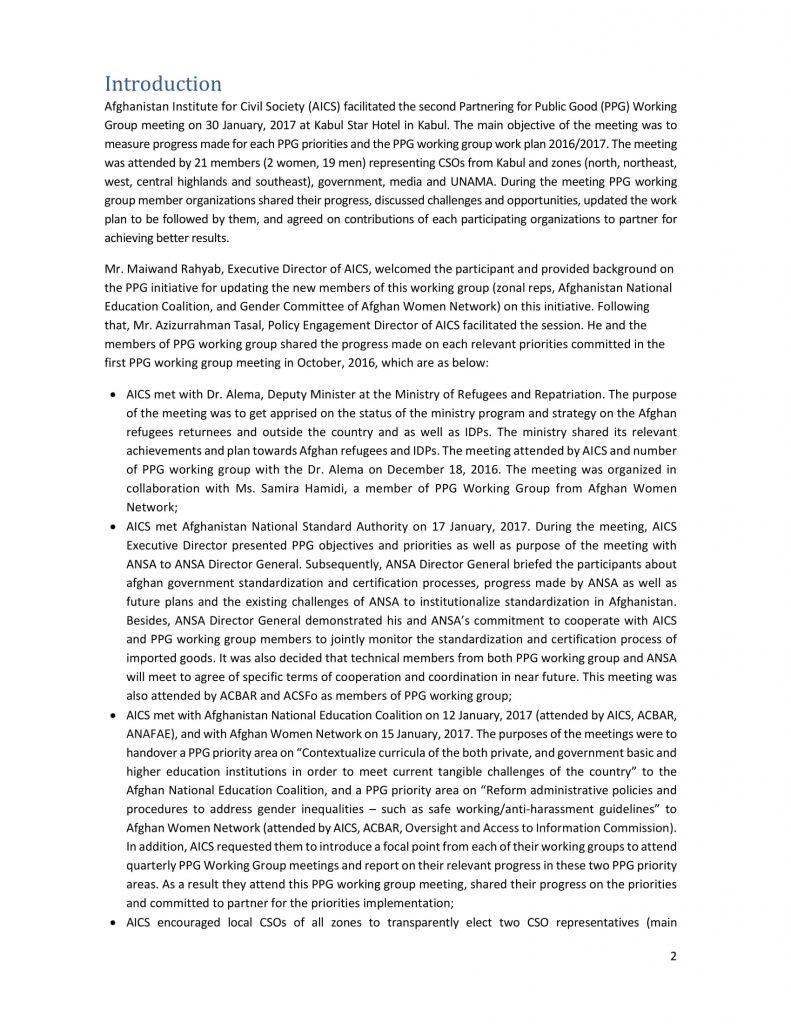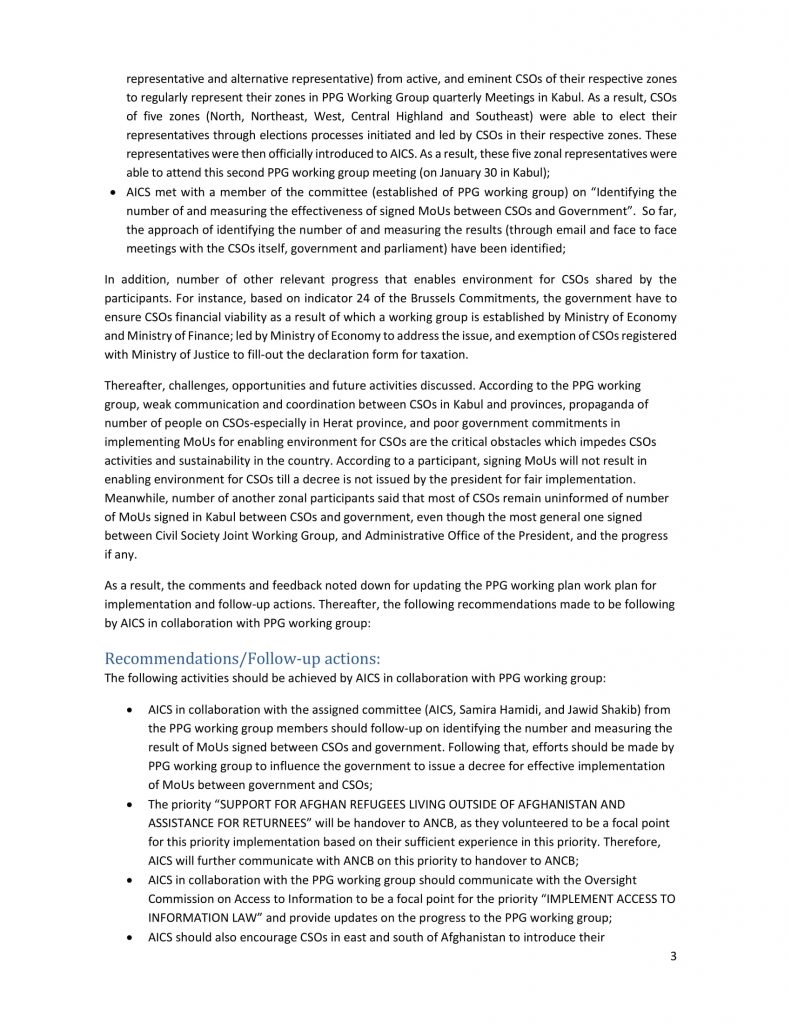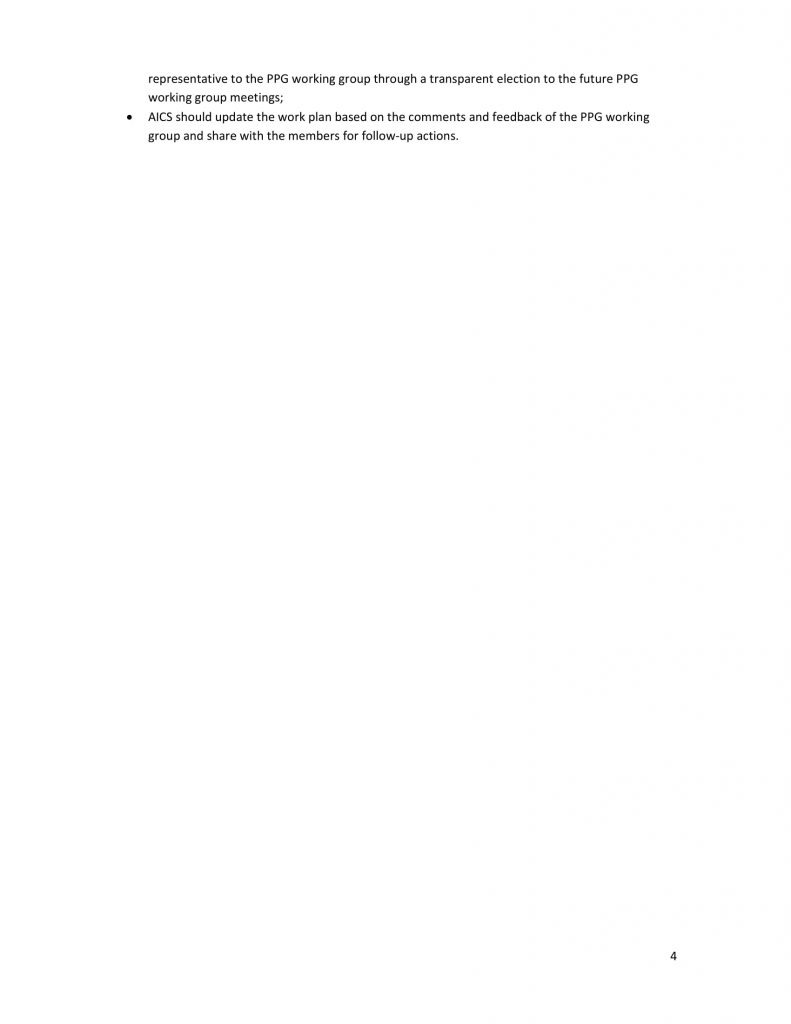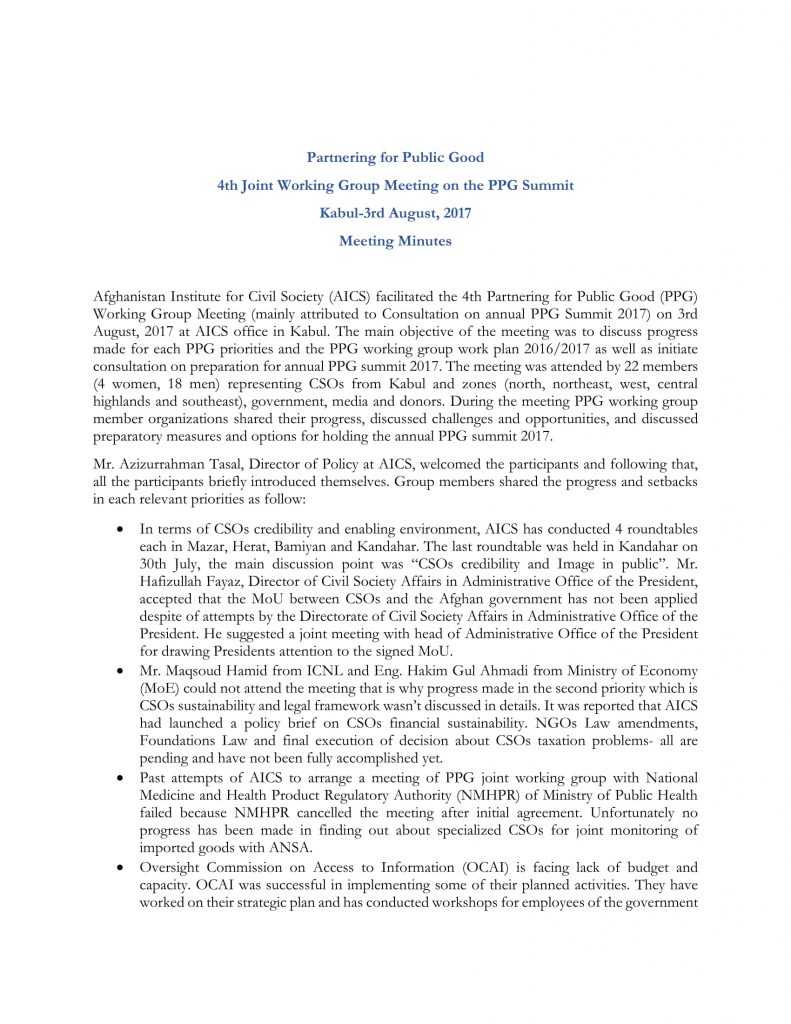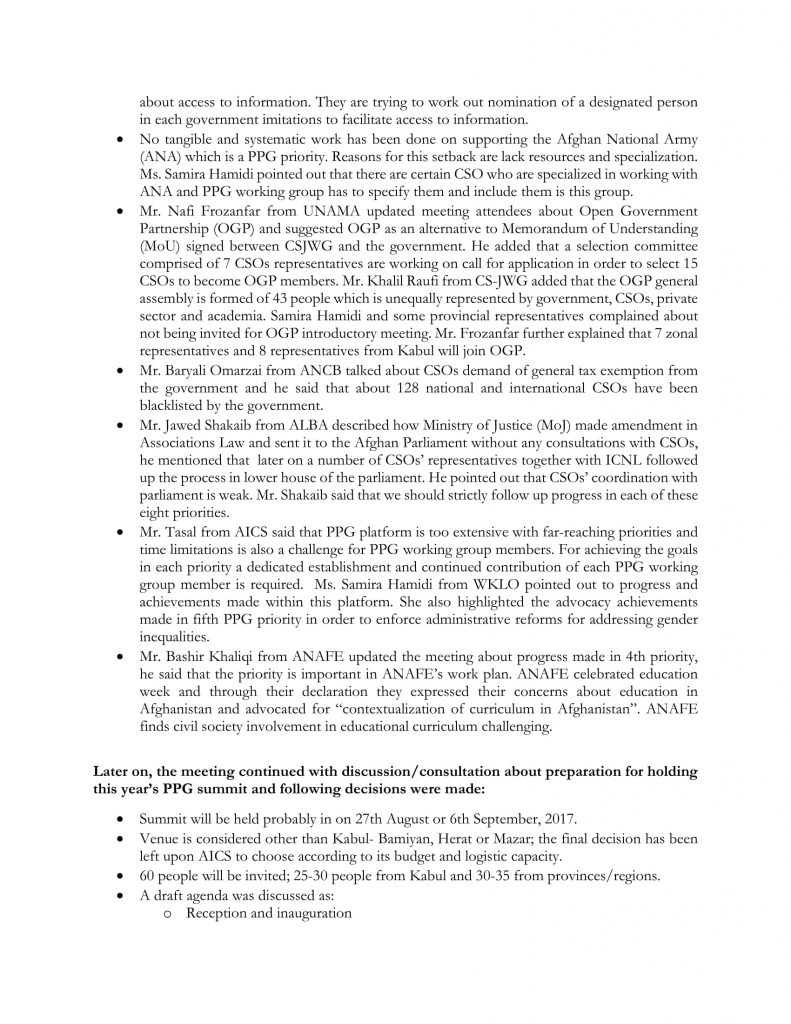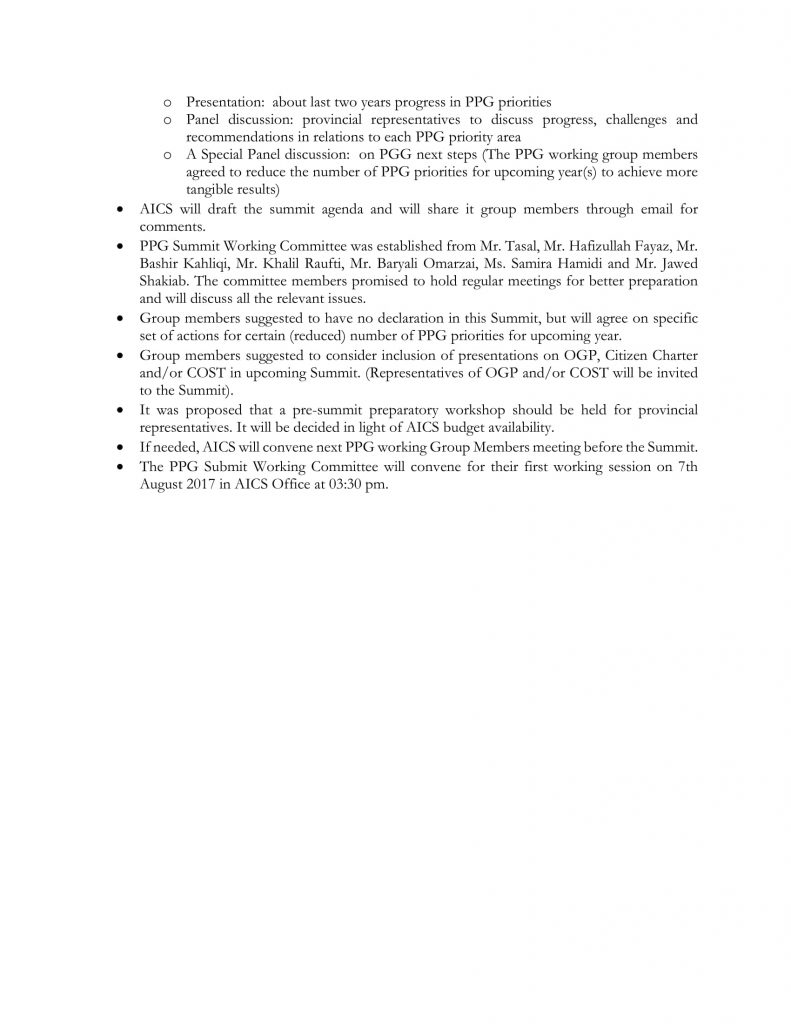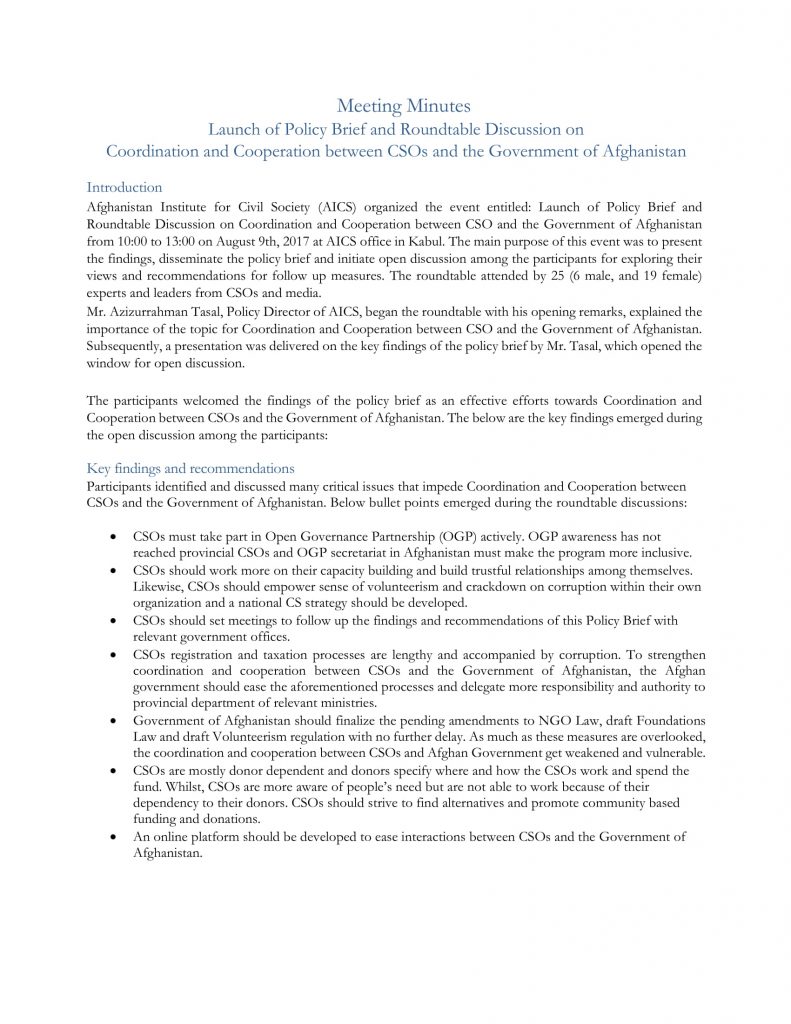Summary Report of 1st Provincial round table on “Financial Sustainability” 2016

SUMMARY REPORT OF 1ST PROVINCIAL ROUNDTABLE ON CIVIL SOCIETY ORGANIZATIONS FINANCIAL SUSTAINABILITY
Introduction:
Afghanistan Institute for Civil Society (AICS) convened its 1st provincial roundtable on “Civil Society Organizations’ Financial Sustainability” on November 21, 2016, in Herat province. The main purpose of the roundtable was to discuss CSOs’ financial sustainability, identify key challenges impeding the financial sustainability of CSOs and come up with recommendations for follow up measures. The roundtable attended by 32 (19 male, and 13 female) experts and leaders from CSOs, government, media, and International None-Governmental Organizations (INGOs).
Key Discussions:
At the inauguration, Mr. Samirullah Popal, Policy Engagement Specialist of AICS welcomed the participants, explained the ground rules for the roundtable discussion and introduced the agenda. Subsequent to participants’ introduction, Mr. Popal delivered a presentation on “The State of Enabling Environment for CSOs in Afghanistan” a report recently published by AICS. The main purpose of the presentation was to establish linkage between findings of stated report on CSOs’ financial viability and purpose of routable, and to inspire thoughts and reflections of participants on discussion agenda. Followings are the main discussion points of this roundtable:
- At the onset, a representative from Women Activities and Social Services Association presented his views about importance of CSOs financial sustainability and indicated that lack of CSOs’ access to financial resources has affected CSOs performance, services and ultimately their credible image in the society. He also added that declining funding opportunities for CSOs will further impede CSOs activities and civil society development as well as deteriorate enabling working environment for CSOs in the country.
- Other participants also added their views and recognized financial sustainability as a biggest challenge for CSOs not only in Herat province but all over the country. Some participants referred their discussions to Ministry of Economy’ recent annual report which indicates that 62 CSOs closed down in Herat province mainly due to lack of access to funding.
- Some participants raised their concerns about further decline in donors fund in upcoming years and emphasized on collaborative action of CSOs to strategically overcome this problem.
- According to some participants, poor capacity of CSOs in proposal writing and lack of CSOs engagement in design of local projects have also reduced their fundraising opportunities. Some CSOs perceived that CSOs’ proposals are lost in some donor organizations or perhaps the donors might be interested only in few CSOs to contract.
- A number of participants believe that the donors should not be a sole source for funding CSOs. CSOs should have their strategy for raising fund form alternative sources, including private sector, membership fees, and individuals.
- Some participants shared their views by describing the role of improved networking between CSOs of Heart and Kabul provinces through different platforms such as Partnering for Public Good (PPG) initiative which can contribute to CSOs’ sustainability.
- Subsequent to Mr. Popal’s elaboration on Partnering for Public Good (PPG), most participants encouraged the role of donors, private sector and media in enlarging opportunities for CSOs sustainability. It was also requested that representatives from regional CSOs should become members of PPG working group to tighten links between Kabul and provinces for enhancing mutual collaborations and achieving better results.
Recommendations:
- CSOs should work collectively to influence donors to simplify their funding requirements for small CSOs.
- Donors should set their funding priorities in line with real community needs as identified by CSOs. Donors should also consult provincial CSOs during design of their projects.
- Donors should design long term programs and undertake effective capacity building interventions to build local CSOs’ capacities on project management and fundraising.
- CSOs should continue to build their expertise and gain more specialized capacities in program design and implementation. This will help CSOs to ultimately take leading role in their programs and raise funds from diverse sources.
- CSOs should continue to strengthen their ties with each other. Close coordination between CSOs will allow them to share their resources and strengths which will have greater impact on their sustainability.
Summary Report of 2nd Provincial round table on “Coordination and Cooperation among CSO’s and Government”
Summary Report of 2nd Provincial round table on “Coordination and Cooperation among CSO’s and Government”
Introduction
Afghanistan Institute for Civil Society (AICS) convened its 2nd provincial roundtable on “Coordination and Cooperation among CSOs and Government” on March 13, 2017, in Balkh province. The main purpose of the roundtable was to discuss coordination and cooperation among CSOs and the government in Balkh province and learn about emerging challenges and opportunities as well as explore participants’ recommendations for follow-up measures. The roundtable attended by 26 (15 male, and 11 female) experts and leaders from CSOs, government, media and INGOs.
Key Discussions:
At the inauguration, the Policy Engagement Director of AICS welcomed the participants, explained the ground rules for the roundtable discussion and introduced the agenda. Subsequent to participants’ introduction, Mr. Samirullah Popal Policy Engagement Specialist of AICS delivered two presentations on “The State of Enabling Environment for CSOs in Afghanistan 2016 ” and “Civil Society Sustainability Index 2015” recently published by AICS. The main purpose of the presentation was to establish linkage between findings of stated reports on CSOs and government cooperation and cooperation and the purpose of routable. Followings are main discussion points of this roundtable:
1- Coordination and Cooperation among CSOs:
While plenty of CSOs have been established and flourished during the past decade in Balkh province, ineffective coordination and cooperation among CSOs in Balkh province has adversely impacted their image, abilities, work impact and advocacy efforts as well as the level of support they entail from public and media. Inconsistent, isolated and uncoordinated efforts of different Balkh-based coordination bodies have reduced the impact of their coordination efforts and effected their advocacy interventions.
Obtaining and maintaining multiple memberships (membership with several coordination bodies) was highlighted as one of the core challenges both for CSOs and coordination bodies which could affect inter CSOs cooperation and impair CSOs’ integrated efforts. There is no holistic and unified database of CSOs of Balkh province as well as for CSOs of the northern region. The absence of regular coordination meetings between CSOs and among different coordination bodies have also distanced CSOs and has caused some misunderstanding and information gaps. The nature of coordination and cooperation among CSOs is more personal (personality-driven) rather than organizational (mandate-driven) which can affect organizations’ identify and civil society image. Moreover, political support for some CSOs has discouraged other CSOs that has eventually reduced level of confidence and enthusiasm for some CSOs to keenly work with local government and approach donors.
Some participants said that the opportunistic and fund-driven attitude of some CSOs have also raised questions about the transparency of CSOs and have affected CSOs’ image and work both with the community and donor organizations. On the other hand, CSOs with a high degree of commitment have been continuously striving to improve CSOs image and overcome challenges affecting civil society work results in the province.
Besides, some CSOs are concerned about duplication of CSOs’ work in the province. They believe that absence of a comprehensive database for CSOs’s projects and areas of their expertise can cause duplication of projects or activities and reduce productivity. Limited coordination among CSOs have further contributed to this deficiency and has triggered unsound competition among some CSOs to grab more fund from donors. Often this competition among CSOs and CSOs coordination bodies have wasted their efforts and reduced development opportunities for CSOs.
Some CSOs are expecting leading coordination bodies to play further effective role for small CSOs capacity building and financial sustainability by channeling development aids from donors and government to grassroots CSOs.
2- Coordination and Cooperation among CSOs and Government:
The Ministry of Economy provincial department in Balkh province is responsible for CSO affairs including coordination of their activities on the ground and oversight from their projects. Every CSO inform the Ministry of Economy (MoEc) about their projects and activities. In addition, the provincial governor has assigned a representative who also coordinate CSOs related activities and report to the Governor.
It was learned that members of line ministries have not been successful to extend required support to CSOs for their program implementation. CSOs are obliged to sign a sector-related memorandum of understanding with concerned line ministries at the provincial level before they launch their projects in the province. However, the processes within line ministries are not very transparent and speedy. For instance, provincial directorate of Ministry of Labor, Social Affairs, Martyrs and Disabled of Balkh province has not been able to issue permission to a CSO with almost six months period to initiate their project activities.
There are concerns that some CSOs are politically connected with government officials. They are invited to provincial events and often supported by officials and some of them have been promoted and awarded. It was also said that such CSOs always appreciate the work of government officials, overlook their weaknesses and evade to voice up against them in favor of public goods. It has impacted CSOs development and raised questions about CSOs independency.
Participants also said that legal environment is complex for CSOs. Some CSOs faced problem when they wanted to clear their taxes or their staff visited Ministry of Finance (MoF) provincial department (Mastofiat) for obtaining Tax Identification Number (TIN).
A CSO (youth parliament 3 member) has also been invited to attend provincial government administrative meetings. Meanwhile,
Provincial government appreciated CSOs’s role in the fight against corruption and requested CSOs to extend
their cooperation with the provincial government.
According to the participants, there are CSOs that pay to insurgents for obtaining their agreement to implement projects in an insecure part of the region. Lack of government ability to eradicate such obstacles has contributed to the continuation of insurgency and restricted CSOs development in the provincial level.
In addition, corruption is also a challenge in Balkh province. It was confessed that inadequately empowered CSOs cannot make much impact upon widespread corruption among government and private sector institutions.
Besides, there is very limited coordination between government and small grassroots CSOs. As a result, smaller and informal indigenous CSOs are excluded and have not been benefited from government support.
Recommendations:
- Awareness should be raised among CSOs to maintain their impartiality, independency and integrity. CSOs should comprehend and follow their mandates and be protected from political influence for their personal gains.
- Coordination and cooperation among CSOs and CSOs’ coordination bodies should be improved. CSOs coordination bodies should establish a comprehensive database of CSOs and their projects. CSOs coordination bodies should increase CSOs awareness on how they will be benefited from their membership services. They should build understanding and coordination among their member CSOs and support them for their sustainability.
- All CSOs should work jointly to improve the credibility of CSOs in the province, and effectively influence national and sub-national government policies for public benefits.
- Every coordination body should call more regular coordination meetings with its member CSOs and improve communication and coordination with other coordination bodies operating in the province.
- CSOs should submit regular reports on their activities to MoEc.
- Bureaucratic processes within line ministries is a constraint towards government support to CSOs. Line ministries should support CSOs to initiate their projects without unnecessary delays.
- Ministry of Finance should provide necessary support to CSOs to declare their taxes and obtain TIN for their employees without unnecessary delay.
- Ministry of Economy should strengthen their monitoring capacity to avoid duplication of projects/activities implemented by CSOs. They should also enhance their coordination with donors to reduce chances for duplication of activities.
Summary Report Of 3rd Provincial Roundtable On “coordination And Cooperation Among CSOs And Government”
AFGHANISTAN INSTITUTE FOR CIVIL SOCIETY (AICS) SUMMARY REPORT OF 3rd PROVINCIAL ROUNDTABLE ON “COORDINATION AND COOPERATION AMONG CSOS AND GOVERNMENT”
Introduction
Afghanistan Institute for Civil Society (AICS) convened its 3rd provincial roundtable on “Coordination and
Cooperation among CSOs and Government” on May 8, 2017, in Bamyan province. The main purpose of the
roundtable was to discuss coordination and cooperation among CSOs and the government in Bamyan
province and learn about emerging challenges and opportunities as well as explore participants’
recommendations for follow‐up measures. The roundtable attended by 31 (20 male, and 11 female) experts
and leaders from CSOs, government and local media.
Key Discussions:
At the inauguration, AICS Policy Engagement Director welcomed the participants, explained the ground
rules for the roundtable discussion and introduced the agenda. Subsequent to participants’ introduction,
he delivered a presentation on “The State of Enabling Environment for CSOs in Afghanistan 2016” and “Civil
Society Sustainability Index 2015”. The main purpose of the presentation was to establish linkage between
findings of stated reports on CSOs and government cooperation and cooperation and the purpose of the
routable. Followings are main discussion points of this roundtable:
1- Coordination and Cooperation among CSOs:
Bamyan has active civil society and plenty of CSOs have been established and flourished during the past
decade in Bamyan province. Incomparable to its neighboring provinces, Bamyan has a considerable number
of active women‐led CSOs who have been active both in service delivery as well as in advocacy initiatives.
Three umbrella organizations (ACSFo, AWN, and CSHRN) are operating in Bamyan province while only AWN
have registered member CSOs and holds regular meeting with its member organizations. ACSFo and CSHRN
Bamyan offices have been facing financial problems and have recently decreased their activities in the
province. UNAMA provincial office has been playing a productive role in establishing coordination among
CSOs in several occasions but does not serve as regular CSO’s coordinating body in the province.
During the discussions some participants raised their concerns about inadequate coordination and
cooperation among CSOs in Bamyan province which has undesirably impacted CSOs image, abilities and
impact of their efforts. Bamyan CSOs were successful when they initiated joint advocacy initiative under the
name of “Jonbish‐Roshnai” which was, later on, mislead by some individuals.
Some participants believe that CSOs have previously promised a lot to the public when they visited local
communities for survey and project implementation. Failing to fulfill their promises have affected their
image in the local community and has reduced community support for some CSOs.
Some CSOs raised their concerns about some leading CSOs who represent CS in national and international
events but don’t reflect general views and only promote their own agenda.
There are some concerns that some CSOs have gradually been converted to family‐based organizations after
they recruited family members and undermined diversity in their organizations. Participants questioned
some leading CSOs who underestimate newly emerging CSOs and intentionally minimize space for emerging
players.
Not having CSO‐led regular coordination meeting among CSOs was highlighted as one of the challenges
both for CSOs and coordination bodies which could reduce inter cooperation and further reduce CSOs’
image among the public and govt. The absence of regular coordination meetings between CSOs and faded
role of coordination bodies can further distance CSOs. Some participants reported that some CSOs have
political support that can ultimately impact the level of coordination among CSOs and collective stand
against government for public interest.
A number of CSOs have been dissolved in Bamyan province after they failed to raise fund for their operation
and program activities. On the other hand, the donor‐dependent status of some CSOs have also raised
questions about the sustainability of these CSOs and have affected CSOs’ image and their work continuity
with their constituencies. Some CSOs don’t follow their projects after completion and are not concerned
about the impact of their projects.
Besides, some CSOs are concerned about duplication of CSOs’ projects in Bamyan province. They believe
that absence of a close coordination among CSOs can cause duplication in projects and reduce productivity.
It was also said that some CSOs ignore local culture and norms when they implement donor‐funded projects
in local communities which has weakened CSOs’ credibility among public and local communities.
Some participants believe that most of Bamyan projects are decided in Kabul and views of Bamyan CSOs
have never been heard when major projects are decided.
It was also said that some CSOs ignore local culture and norms when they implement donor‐funded projects
in local communities which has weakened CSOs’ credibility among public and local communities.
Some participants believe that most of Bamyan projects are decided in Kabul and views of Bamyan CSOs
have never been heard when major projects are decided.
CSOs believe that financial sustainability is a major concern for CSOs in Bayman province. Some CSOs are
expecting the leading CSOs to play a further effective role for financial sustainability of small CSOs by
establishing partnership opportunities and initiating sub‐grant mechanisms.
2- Coordination and Cooperation among CSOs and Government:
Some CSOs reported that they are not very satisfied with the level of CSOs engagement in policy formulation
processes in the province. They revealed that limited number of CSOs are mostly consulted and invited to
attend discussions held specifically about the economic and social development of Bamyan province. Some
CSOs said that they are consulted by provincial government, but their views and recommendations have not
been taken seriously. For example; provincial government has never invited CSOs representative(s) when
they convened meetings to define “fix‐price” for lands intended to build urban cities in Bayman province.
Provincial government claims that it has assured CSOs’ participation in important agendas and policy
discussions. Provincial government representative reported that provincial government has established
diverse consultation platforms for CSOs such as; 1) regular meetings with CSOs representatives ; 2) periodic
meetings with women‐led CSOs; 3) regular meetings with women‐led business organizations; 4) regular
meetings with representatives of political movements; 5) regular meetings with Ulemas and with provincial
council. It was also reported that provincial government has also invited a CS representative to observe
recruitment process in government organizations and attend PDC meetings.
A CSO (youth parliament 3 member) has also been invited to attend provincial government administrative meetings. Meanwhile,
Provincial government appreciated CSOs’s role in the fight against corruption and requested CSOs to extend
their cooperation with the provincial government.
The provincial department of Ministry of Economy in Bayman province is responsible for CSO affairs
including CSOs reporting, coordinating CSOs’ activities with other local government institutions, and
monitoring CSOs’ projects. In Bamyan province, CSOs have less knowledge about requirements of CSOs’
reporting to MoE. There are a lot of CSOs who failed to submit regular reports to MoE. Some CSOs
recommend that government should penalize those CSOs who don’t report to the government in spite of
frequent reminders and orientations.
Some CSOs believe that CS would object government and do not support every government undertaking. There should be a separating line between CS and govt. Some CSOs do not object government as they don’t want to disappoint government. CSO image and credibility have been affected recently in the country and their voice has less been heard. Some participants said that CS and government are two different sectors of the society. A line should separate their roles and functions. CS should monitor government functions and report on government weaknesses and shortcomings.
It was learned that members of line ministries have not been successful to extend required support to CSOs
for their program implementation. It was also indicated that provincial government i.e. ministry of economy
is not very successful in monitoring most of CSOs projects/work.
“Though current governor is more supportive to CSO, some CSOs are not invited to important events
organized by provincial government” said by a CSO representative.
Some CSOs questioned the transparency in government and nongovernment organizations and indicated that corruption has also deteriorated coordination and cooperation between government and CSOs and created more distance between the public and these two sectors. Some CSOs also expressed their concerns about Ministry of Finance (MoF) taxation and reporting procedures.
Recommendations:
- CSOs should be protected from political influence and work for the public good. CSOs’ movements and
advocacy campaigns should be protected from political influence and individual’s pressure.
Civil society concepts should be taught in schools and it should become an integral part of school
curricula.
Coordination and cooperation among CSOs should be improved. CSOs coordination bodies should
establish a comprehensive database of CSOs and call member organizations’ regular coordination
meetings
- CSOs should work together to build the credibility of CSOs with local communities.
- The provincial government should give equal opportunity to CSOs’ representatives to attend government
meetings and discussion forums. - Ministry of Finance should provide necessary support to CSOs to clear their taxes.
- Ministry of Economy should strengthen their monitoring capacity and monitor CSOs projects.
- All CSOs should submit regular reports on their activities to MoEc. CSOs failed to report to MoE should
be warned and ultimately penalized. - MoE provincial department should initiate regular CSOs coordination meetings and increase access to CSOs.
Partnering for Public Good 3rd Joint Working Group Meeting on the PPG Summit Kabul 2017

Executive Summary:
Afghanistan Institute for Civil Society (AICS) facilitated the 3rd Partnering for Public Good (PPG) Working Group meeting on 24th May 2017 at Park Star Hotel in Kabul. The main objective of the meeting was to measure progress made against each PPG priorities and the PPG working group work plan 2016/2017. The meeting was attended by 21 members (4 women, 17 men) representing CSOs from Kabul and zones (north, northeast, west, central highlands and southeast), government and media. During the meeting, PPG working group member organizations shared their progress, discussed challenges and opportunities, updated the work plan, and emphasized on contributions of each participating organizations to partner for achieving better results.
Mr. Maiwand Rahyab, Executive Director of AICS, welcomed the participants and provided background information on the PPG initiative. Mr. Rahyab talked about some challenges facing the working group in terms of following up and making all the participants attend the meetings and implement collective tasks regularly. Following that, all the participants briefly introduced themselves and then AICS Policy Engagement Director facilitated the meeting. He and the members of PPG working group shared the progress made against relevant priorities committed in the first PPG working group meeting in January 2017, which are as below:
- Khalil Raufi briefed the attendees about progress made in terms of MoU implementation which has been signed between CSOs and government; CSJWG met with President Ghani on 6th May. President Ghani assured CSJWG that CSOs must be involved in monitoring every area and CSOs should cooperate with the electoral commissions technically. CSOs have successfully monitored the recruitment process by Independent Administrative Commission. While things are better in the center, in rural areas of Afghanistan local authorities do not cooperate with CSOs. Later on, Mr. Fayaz Director Civil Society Department of Office of Administrative Affairs talked about Afghanistan’s membership in OGP (Open Government Partnership) and active involvement of CSOs. A joint secretariat will be formed of CSOs in terms of OGP (Open Government Partnership).
- AICS has conducted 3 roundtables in Herat, Mazar, and Bamiyan and planning to conduct the forth RT in Kandahar after the month of Ramadan. The recent roundtable conducted by AICS was in Bamiyan and the subject of discussion was “Coordination and Collaboration among CSOs and Government”. All Round Table reports which have been conducted by AICS are available on AICS website
- NAI representative pledged their full support to better coordinate between media and CSOs. Members of the working group had suggestions for a wider platform through media for CSO’s such as CSO’s attending TV roundtables to depict a positive image of CSO’s and they asked NAI to practically pave the ground. NAI promised to undertake measures in this regard.
- ACBAR has developed a picture book on “introduction of NGOs to the People” for public awareness. In this regard, consultation sessions with CSO’s on the development of the book has been conducted and the process will be finalized after including all CSOs views, and then it will be published and distributed throughout Afghanistan. ANCB requested ACBAR to seek input from coordination bodies before publishing the book. This awareness will help to educate the role of CSOs/NGOs to people and raise CSOs’ credibility.
- ICNL briefed on the creation of 2 committees; a technical and leadership committee which comprises Ministry of Economy (MoE), Ministry of Finance (MoF) and CSO to address tax and reporting problems of CSOs, as a result, tax payment process has been deducted to 3 phases which used to be 5 phases. Meanwhile, Ministry of Justice (M0J) has amended the Associations Law with limitations for the association; and advocacy committee has been created to address this challenge. ICNL has been meeting IDLG to address problems of NGOs in dealing with local authorities, as a result, a mechanism is about to be launched for both NGO’s and local authorities throughout 34 provinces. MoE is about to build a single reporting mechanism for NGOs. ICNL has worked with MoE on amendments to NGOs’ Law which will be sent to MoJ and will pass its official process. In addition, according to the MoF and MoJ final decision, foundations will not pay taxes unless they are granted funds.
- ACBAR has conducted capacity building workshops and training based on Afghanistan Civil Society Support Initiative. Training is to cover 16 provinces which are about NGO Law and Project Design. These training will build CSOs’ capacities in project design and will contribute to their sustainability.
- AICS launched its Policy Brief about Financial Sustainability of CSOs on 29th CSOs should be encouraged to use this policy brief as a tool to advocate and convince donors to better support CSOs and their sustainability.
- Meanwhile, PPG working group asked the Director Civil Society Department of Office of Administrative Affairs to facilitate a meeting with National Medicine and Health Product Regulatory Authority (NMHPR) of Ministry of Public Health, past attempts of AICS to a arrange a meeting of PPG joint working group with this department failed because NMHPR cancelled the meeting after initial agreement. Meanwhile, ANSA requested PPG joint working group to introduce CSOs who has the technical expertise to join ANSA for joint monitoring of imported goods.
- ANAFE increased members of the Education Coalition, commemorated the Education Week and conducted Education campaign conference which comprised issue such as schools’ immunity, children out of school and educating school teachers. Afghanistan Education Coalition will continue to influence the Curriculum Directorate of MoE to amend curriculum in a fever of public needs and contextual requirements of Afghanistan.
- Samira Hamidi AWN board member briefed the meeting about their meetings with President Ghani on criminal context of Elimination of Violence against Women Law, as a result, the President agreed not including the criminal context of EVAW Law in the criminal code and instead agreed upon a separate Law. Government agreed on reviewing the criminal code due to its technical shortcomings and gender inequality issues and AWN is a part of this reviewing process. She complained about lack of support and weak participation of other CSOs and networks in AWN’s advocacy measures for EVAW Law.
- Oversight Commission on Access to Information (OCAI) informed the group about a strategy for implantation of Access to Information Law which will be finalized within 1-2 months. Moreover, OCAI has observed 11 governmental departments in terms of Access to Information Law implementation, as a result, they have categorized and ranked each department from best to worst, their first report has been shared through media with the public. OCAI has been working on amendments to the Access to Information Law and simplifying access to forms for Access to Information within governmental administrations. Moreover, OCAI has planned to meet with MoE, MoF and MoJ authorities in order to intercalate access to information content into NGOs’ Law.
- ANCB and PPG working group zonal representatives shared their concerns about refugees, returnees and internally displaced people (IDPs). Returnees face potent challenges in terms of their educational certificate credibility, employment, and shelters. UNHCR no more supports returnees as before and people are somehow discouraged to come back home.
- PPG working group zonal representatives raised their concerns about negative image spreading about CSO in some provinces and decreasing support of local authorities from CSOs and their work.
Recommendations/Follow-up Actions:
- PPG working group members recommended to evaluate progress in each PPG priority and continue focusing on 3-4 priorities that are more relevant and result-oriented. It was also recommended that PPG working group should foster advocacy efforts in these selected areas/priorities and endeavor for more measurable results.
- NAI agreed to felicitate CSOs’ access to media platforms in order to advocate for CSOs credibility by introducing CSOs work and achievements to the public.
- PPG working members requested Civil Society Department in Office of Administrative Affairs to help PPG working group to arrange a meeting with Quality Control Department of MOPH.
- PPG working group zonal representatives requested CSJWG and Civil Society Department in Office of Administrative Affairs to introduce OPG, and Mutual Cooperation Mechanism signed between Civil Society- Joint Working Group and the Office of Administrative Affairs, to CSOs in the provinces as they are interested to know about the role of provincial CSOs in these important initiatives.
- ANCB will establish a working group of CSOs working in the areas of refugees, returnees, and IDPs, to closely follow relevant concerns with Ministry Refugees and Repatriation.
- PPG working group members agreed to regularly attend PPG working group members’ quarterly meetings. AWN will be requested to brief the group on progress made in priority 5 “REFORM ADMINISTRATIVE POLICIES AND PROCEDURES TO ADDRESS GENDER INEQUALITIES – SUCH AS SAFE WORKING/ANTI-HARASSMENT GUIDELINES”
- PPG working group members shared their concerns about the delay in finalization/enforcement of new NGO Law. It was recommended that CSOs should advocate accelerating the process in MoE and MoJ.
Thematic Roundtable on “Image and Credibility of CSOs in Public”
Policy Brief and Roundtable Discussion on Image and Credibility of CSOs in Public
Summary Report
Afghanistan Institute for Civil Society (AICS) launched the policy brief “Image and Credibility of CSOs in Public” on 8th July 2018 at the AICS office with 19 participants (5 female and 14 male). This event started with the opening speech of Director of Policy and Engagement and followed by a comprehensive presentation on findings of the policy brief. He stated that according to SEECA 2017, only CSOs involved in service delivery activities that provide tangible benefits to communities possess good public support and CSOs involved in advocacies and rights-based campaigns lack the support. This could be due to “government-owned” CSOs, donor-oriented objectives, dependency on external funding and the associated competition.
Furthermore, media thprofit-orientedital role in promoting CSOs image in public often do not have the tendency to support CSOs without huge amount of financial interest which is due to their profit oriented vision. People in suburb areas of the country have no information about CSOs and their functionality. Subsequently, more of the key findings of policy brief were presented by him and during the session he addressed participants’ questions and comments. Following the presentation, participants started an open discussion regarding the key findings of the brief. Participants raised their concerns regarding low public support to CSOs that has restraints opportunities of indigenous funding. Participants stated that due to project oriented functionality of NGOs, people’s real necessities are under looked and this causes people’s trust to minimize and in some cases totally blur.
Corruption which domineers both government and CSOs systems is another cause of CSOs disrepute; corruption has hindered transparent and efficient service delivery to the public. From the other hand, since CSOs do not have any public reporting mechanism through which they could account to the public of their projects and spending, people have the strong assumption that CSO are just some western supported agencies that waste money on unnecessary projects that do not reflects people’s real needs.
Corruption which domineers both government and CSOs systems is another cause of CSOs disrepute; corruption has hindered transparent and efficient service delivery to the public. From the other hand, since CSOs do not have any public reporting mechanism through which they could account to the public of their projects and spending, people have the strong assumption that CSO are just some western supported agencies that waste money on unnecessary projects that do not reflects people’s real needs.
In order to address the current and future challenges that CSOs face in terms of their credibility in public, growing monolithic civil society is prerequisite. Their strong tie with government, media and private sector can ensure efficiency and transparency and eventually more public support. Participants reiterated that CSOs should focus on funding diversification and communicate with the donor community to ensure they are more involved in assessing people’s real needs and designing projects. They also demanded more technical support in terms of CSOs capacity building and developing country wide and up to date databases where people find more about CSOs and their work.
At the end participants insisted on formation of certain follow up mechanisms so that recommendations of this paper get to a practical stage.


